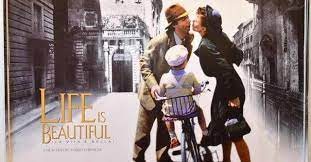A Critic's Meta-Review: 4/5
La Vita è Bella (REVIEW)
It’s not every day you watch a movie that causes you to press pause and earnestly state out loud to yourself, “Wow — this might actually be better than The Big Lebowski!” and yet this film did have me doing literally just that, well within the first act. As a matter of fact, I knew from the first scene that I was going to love this movie. I mean, here are these two blokes — a poet and a waiter, which just so happen to be the exact same two occupations held by myself and my roommate, respectively — who just come rolling across gorgeous Italian hilltops in their lovely convertible, crash land into the home of beautiful woman, with one of them (the waiter) taking with him her heart (and her eggs, to make frittatas — a word that I did not realize directly translates to omelette until watching this film, which kind of makes me laugh thinking about all of the times I have been to a fine dining establishment and was presented with a menu that offered me the option of order a “frittata” as if it were its own sort of thing and not simply a garden variety method of preparing eggs that everyone and their little baby cousin (the one who never did figure out just how Jeopardy works [R.I.P. Alex Trebeck, by the way; he truly did have the answers]) learned to make well before we learned about the lattice method of multiplication (and long since after we all have forgotten how it works).
But this was much more than a mere method of learning some practical Italian, although it certainly did assist in that regard; this was a cinematic experience. Not since I rewatched The Godfather (which, coincidentally, was also directed by an Italian and features a primarily Italian cast, Italian dialogue, and, at least for a sizable stretch, is set in Italy) last summer after drinking that rather curious cup of tea that my cat made for me in the other room have I felt this way when watching a film. The only exception might be the movie 8½ - another one from the boot.
There is just something about the way that Italians approach acting. Perhaps it is the language itself, which, to me, sounds like a more playful version of Spanish. It’s much more...sing-songy. I guess that is the best way to describe it. Well, it is the only way I can really describe it, so either way that is what we are sticking with...capisce?
Such is my admiration for Italians that during this film, when the phenomenally played main character - Guido, the prince - is posing as the fascist inspector in order to mack on that honey with the eggs from earlier and starts going into that “Italians are the superior race” farce (which he does not do a particularly good job of concealing all of the snark behind, by the way), I honestly could not help but at least think to myself “well, I mean, they are pretty freakin’ cool, ya know” as if I was one of those mild-mannered side characters that are often featured in films directed by Joel and Ethan Coen (side note: after checking out this flick, do yourself a favour and watch Burn After Reading).
Speaking of memorable scenes, this movie is chock full of them. That is one of the things I look for most in a good movie, to be honest. I mean, a sound plot is somewhat important I guess (though, in my opinion, not really necessary) but a film is nothing unless it has at least one scene that remains permanently embedded in your memory bank. That is what acting and directing - making movies, period - is all about, if you ask me: the art of crafting memorable scenes.
Based on the aforementioned rubric, this cat - Roberto Benigni, the director and star of the film - is an absolute genius. Some of my favorite scenes are (roughly in order, and without spoilers): when Guido is speaking to the fascist with the cool hat (which itself plays quite a pivotal role but, unfortunately, too spoiler-adjacent a role to make much mention of here) and begins to shift the discussion towards politics, only to be interrupted by him turning to his kids and yelling “Benito! Adolpho! Knock it off!!”, which is probably the most effective way to get a Jewish guy to steal your hat; when Guido and his poet friend are laying in bed talking and the poet falls asleep mid-conversation, then explains how he was able to do such a thing by citing Schopenhauer and his conception of the will; when the politician comes to be served at Guido’s fancy all-white (in reference to the color scheme, not the race of its guests) restaurant and Guido, by describing a series of faux menu options in a rather unsettling manner and then listing one regular-sounding choice, is able to convince the guy to order what he just so happened to have just served the gentleman seated at the table next to him (who was not planning on eating any of it), allowing him to flex those fast server skills (server, not servant - a distinction Guido’s uncle so wisely points out early on in the film).
I will not say much about the latter half of this film because I want you all to watch it. Just know that it damn near moved me to tears. This man Guido is what every father - nay, every human being, period - should strive to emulate.
I now have a new code. The Dude still abides, but he does it while swaying his arms from side to side and bellowing “arrivederci!” like a slightly-less-chiselled (but getting there!) Brad Pitt.

